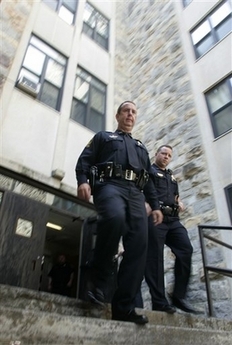Va. Tech gunman 'well-prepared' to go on
(AP)Updated: 2007-05-22 08:54
BLACKSBURG, Va. - The gunman who killed 30 people at a Virginia Tech building was "well-prepared" to continue his shooting spree with more than 200 additional rounds of ammunition, a state panel was told Monday.
Police found 203 live rounds in Norris Hall, where Seung-Hui Cho killed 25 students and five faculty members before committing suicide on April 16, State Police Superintendent William Flaherty told a panel investigating the massacre. Cho also shot two other students elsewhere.
"He was well-prepared to continue on," Flaherty said.
Cho fired 174 shots from two handguns on the second floor in a span of nine minutes, taking his own life at 9:51 a.m. as police on the stairwell approached the floor, Flaherty said.
Asked to describe Cho's shooting method, Flaherty said, "I would describe it as very deliberate. There seemed to be nothing panicky at all."
Earlier, after hearing testimony from a Virginia Tech attorney that privacy laws prohibit release of students' mental health and other records, panel member Tom Ridge said the group needs to find a way to gain access to Cho's records.
"We'd be remiss if we didn't do a real deep dive into this area," said Ridge, the former US Homeland Security chief.
Cho was found "mentally ill and in need of hospitalization" in December 2005, according to court papers. A judge ordered him into involuntary outpatient treatment, but there is no indication that Cho complied.
University counsel Kay Heidbreder said student privacy rights prevent release of most records. Even within the university, the records cannot be shared among departments, she said.
Ridge said that he understood that privacy rights are necessary, but that he believes in this case the panel should do what it can to get Cho's records.
Panel chairman W. Gerald Massengill said the group would be willing to receive the information in closed session if necessary.
Cho's family, which would have access to the records, has cooperated so far, Flaherty told reporters.
Also Monday, the panel visited the two buildings where the shootings occurred. The tour included a more than two-hour private briefing, featuring a presentation by Virginia Tech police chief Wendell Flinchum, who led the initial response to the shootings.
Such information will not be made public until police meet with victims' families, Flaherty said.
It was helpful to hear about the shootings from people who were there and to view the shooting sites, Massengill said.
"I've seen and heard a lot in my career," said Massengill, a former State Police superintendent who oversaw the agency's response to the Sept. 11 attack on the Pentagon and the 2002 Washington-area sniper attacks. "This is almost undescribable."
The panel toured West Ambler Johnston Hall, the dormitory where the first two students were killed, and the classrooms of Norris Hall.
The briefing and tour were closed under provisions of the Virginia Freedom of Information Act that protect students' privacy and briefings by law enforcement agencies. Reporters for several news organizations had objected, saying it did not appear the grounds for closing the meeting were properly applied.
During the open portion of the meeting, Massengill asked Tech president Charles Steger whether he thought the contents of the first e-mail the school sent to students and employees should have been more specific. The mass e-mail sent at 9:26 a.m. - more than two hours after the first shooting - said police were investigating a shooting at West Ambler Johnston and warned students to be cautious and contact police about anything suspicious.
Massengill asked Steger whether the e-mail should have said, "We've had a shooting and the shooter has not been apprehended."
Said Steger: "The most prevalent question I get is that question."
He said university officials were worried about causing panic on campus. Steger also noted that police initially thought the shooting was a domestic dispute, and officers already were questioning a person of interest.
Gov. Timothy M. Kaine created the eight-member panel, asking it to gather information about the gunman, how the events unfolded, and how the state and other agencies responded.
Additional meetings are set for next month. Kaine had said he hoped the panel could complete its review before classes resume in August. The university also is conducting its own review, which it expects to complete by late August.
|
||
|
||
|
|

